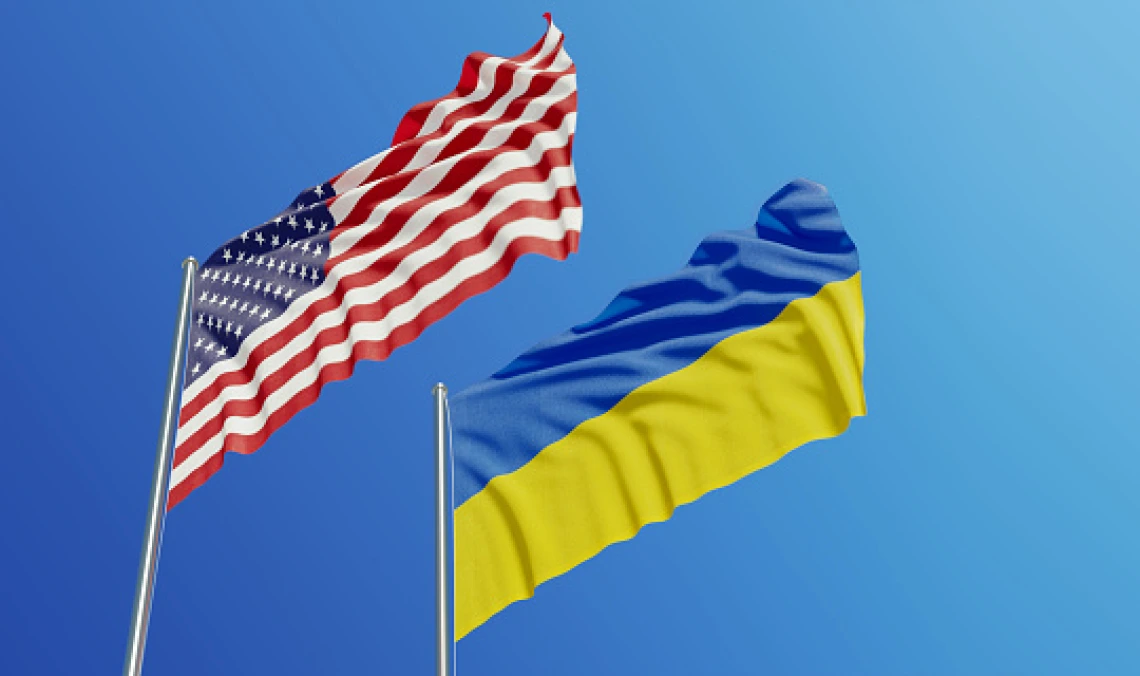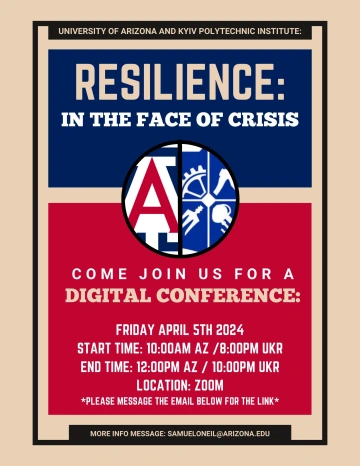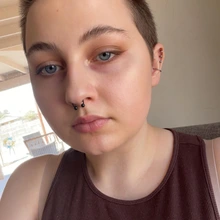UA human rights practice students reflect on joint conference with Ukrainian students in Kyiv


Since shortly after the Russian invasion of Ukraine in 2022, the UArizona Human Rights Practice Program has been partnering with faculty and students at Kyiv Polytechnic Institute (KPI), the National Technical University of Ukraine. One of the major collaborations was the joint development of an online student-run conference on April 5, 2024 entitled "Resilience in the Face of Crisis" which featured four presentations by UArizona and KPI students (see summaries below).
In this blogpost, two of the lead UA student organizers -- Sam O'Neill and Mitch Conroy -- reflect on this experience. Sam and Mitch are Human Rights Practice students whose work was supported in part by the Resilience Internships and Student Experiences (RISE) Program sponsored by the Arizona Institute for Resilience.
By Mitch Conroy
Throughout the past six months, we’ve had the great opportunity to work closely with students at the Kyiv Polytechnic Institute – a technical university in Kyiv, Ukraine -- through regular meetings to discuss and organize the UA-KPI Student Conference titled “Resilience in the Face of Crisis,"

Originating from our early collaboration efforts in 2022, KPI and the UA Human Rights Practice Program have been working together on multiple fronts to help the human rights efforts in Ukraine. The connections between our universities fostered the creation of presentations to be created focusing on the ideas of collaboration between our universities, and resilience in times of crisis.
As members of the organizational committee, led by Sam O’Neil, we learned a lot about what it takes to put on a conference like this, and how important it is to be flexible with international collaboration. During the planning stages for the conference, we hit many bumps in the road surrounding scheduling, organizing, and participating. However, we persevered through these challenges and hosted the conference in early April.
Four groups presented their projects at the conference to a group of audience members, that exhibit unique solutions that provide a gateway for innovations that can not only be applied to those facing adversity as a result of war but for those facing barriers throughout the world. Ideas circulated throughout the conference, highlighting the importance of partnerships and putting our minds together toward a collective goal. Below is a brief summary of the four projects with more information available upon request.
Ultimately, throughout this process, I believe that everyone gained important experiences and insight into international collaboration and how important it is for us to work together towards a common goal. Resilience in the face of adversity is essential for Ukraine to continue to fight against its invaders. Focusing on resilience in times of crisis, like the Russian invasion, will hopefully allow students at UA and KPI to nurture ideas and create real change. Though many of these projects are in their initial stages, they all can ultimately develop to benefit Ukrainians and people worldwide to continue to persevere through difficult times.
Though this student conference was small, we hope to have laid some of the groundwork for the continued collaboration between the University of Arizona and Kyiv Polytechnic Institute. Our universities have already learned so much from each other. Connections between students were formed, and will hopefully continue to grow and prosper as time goes on.
By Sam O'Neill
This collaborative process has not only been monumental in showcasing UArizona's ongoing support for those in Ukraine but has also helped foster the development of relationships and connections between students that extend beyond an education context.
I have learned greatly from my peers at KPI about Ukrainian history, norms, and nuances– that have not only deepened my appreciation for Ukrainian culture but also helped develop my professional skill set. Exposure to a different educational culture has highlighted the importance of common ground and personal connection when approaching not only human rights issues but also any professional or educational endeavor I might go through.
I think that developing this deeper and more personal relationship is key to removing the disconnect that can often happen as a result of the lack of experience for those starting out in the field (including myself), many of whom have the privilege of not experiencing human rights violations firsthand. I encourage all people with this privilege to make an active effort to establish these relationships and understand on an individual level the intense hardship each person facing human rights abuses experiences on a daily basis.
I’m excited to see how this connection between our universities flourishes as students match other students and faculty that meet each of their interests– as we continue to exchange ideas into the new school year.
Abstracts of the Conference Presentations
Project One: The first of the four projects was entitled “Hoverosity”, which focused on resilience in education following the war, especially since Ukrainian schools continue to be heavily disrupted by power outages and ongoing displacement. The Hoverosity project utilizes the new technology of VR and AI similar to that of the Meta world to create a virtual classroom experience that helps to provide quality education to those unable to attend an institution physically. This project would provide a low-cost education option to those facing barriers to education and would have the goal of delivering accredited degrees that would be internationally recognized.
Project Two: The second of the four projects provided unique housing options that can be applied to areas of great residential loss whether that be from conflict or natural disasters. Many of the housing ideas were centered around sustainability and affordability to ensure they are feasible as well as long-term solutions for those being displaced from their homes. Options included using new technology spreading throughout housing construction in the United States including the rise of 3-D printed homes that can be made quickly and efficiently. Other unique housing options included: storage container homes, pallet homes, and generative design techniques (using AI to create optimal home or furniture designs based on a given metric).
Project Three: The third project provided a comparison of KPI and UArizona in terms of how their education systems are set up including similarities between the two universities. This included a comparison of the two universities’ involvement with the space programs within their respective countries: KPI’s work on the “Satellite PolyITAN-12U” and UArizona's work on “OSIRIS-REx”. This project further delved into how the Urizona could show support to KPI educationally by stressing the importance of double degrees, volunteering, and online mobility that would further connect the two universities along with their respective knowledge.
Project Four: The fourth project centered upon the design of a mental health app that bridges the gaps between many singular-use apps by creating a one-stop shop for mental health support. The goal is to ultimately help Ukrainians increase resilience through the mental health strains that are resulting from the war. By researching pre-existing mental health apps, these projects took the beneficial aspects of those apps to then continue to evolve them and further personalize them to support Ukrainians' mental health and well-being. The app design would include mood tracking, meditations, breathing exercises, training programs, daily affirmations, and a database of mental health support information, therapists, and hotlines.

